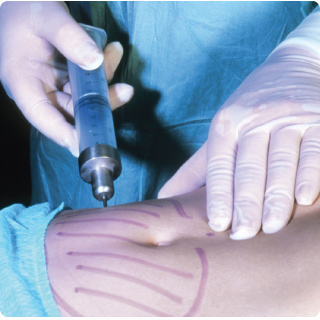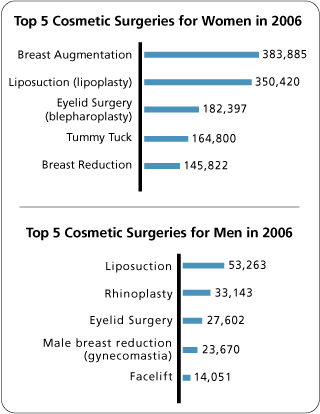 |
 |
 |
 |
FDA Home Page | Search FDA Site | FDA A-Z Index | Contact FDA
Consumer Update |

Photo Researchers, Inc.
Liposuction involves inserting a needle through the skin and drawing out some of the underlying fat. It is being done here to add definition to the abdomen. The area which will be affected has been marked in purple.
On this page:
Liposuction is the most popular form of cosmetic surgery in the United States, according to the American Society for Aesthetic Plastic Surgery (ASAPS).
The 403,684 liposuction procedures performed on Americans in 2006 represent a 128% increase over the number performed in 1997. Interestingly, this same procedure—during the same year—was the top cosmetic surgery performed on men in the United States. In addition, the 383,885 liposuction procedures performed on U.S. women ranked second only to breast augmentation.
If you are considering joining the millions of people worldwide who have had liposuction, FDA's Center for Devices and Radiological Health, which regulates the medical products used in liposuction, suggests you consider the following before having the surgery:
In the United States, FDA regulates the sale of medical devices and drugs that physicians use to perform liposuction. This includes equipment such as canulas, pumps, collecting containers, and ultrasound probes, as well as anesthetics used during the procedure.
FDA does not have authority to
FDA also cannot

Source: American Society of Aesthetic Plastic Surgery
![]()
Plastic surgeons and dermatologists often perform liposuction, but any licensed physician may perform the procedure.
While some physicians' professional societies recommend it, no standardized training is required for conducting liposuction. You may want to base your decision to have liposuction on whether or not a doctor has had specialized training in the procedure, and has successfully performed it before.
Liposuction may be performed in a doctor's office, surgical center or hospital. Because it is a surgical procedure, it is important that
Remember, even the best-screened patients under the care of the best-trained and experienced physicians may experience complications as a result of liposuction.
For more information, visit www.fda.gov/cdrh/liposuction/
Will you like your looks after liposuction?
The cosmetic effect after liposuction may be very good and many patients report being satisfied. However, your appearance afterward may not be what you expected or wanted. Some physicians counsel their patients that reasonable expectations are important.
The results may not be permanent.
If you gain weight after liposuction surgery, the fat may return to sites where you had liposuction or to other sites.
Liposuction is not for everyone.
You are probably not a good candidate for liposuction surgery if cost is an issue. Most medical insurance will not pay for cosmetic liposuction, and the cost may be significant. You are also probably not a good candidate if you are overweight or obese and trying to lose weight, if you have a disease or are on medication that affects wound healing, or if your skin elasticity is inadequate. Lack of skin elasticity can cause the area the fat was removed from to be baggy after liposuction.
There are alternatives.
These include changing your diet to lose excess body fat, exercising, accepting your body and appearance as it is, or using clothing or makeup to downplay or emphasize body or facial features.
Make sure you understand the procedure and what you can expect.
It is important for you to read the patient information that your doctor provides so that you understand the risks involved. Ask about potential problems that could occur, and ask about the physician's experience in performing liposuction.
How accurate is the advertising?
Be wary of advertisements that say or imply you will have a perfect appearance after liposuction. Remember that advertisements are meant to sell you a product or service. Also, don't base your decision simply on cost.
Don't be pressured.
Take your time to decide whether liposuction is right for you and whether you are willing to take the risks of the surgery for its benefits.
Date Posted: August 20, 2007
![]()